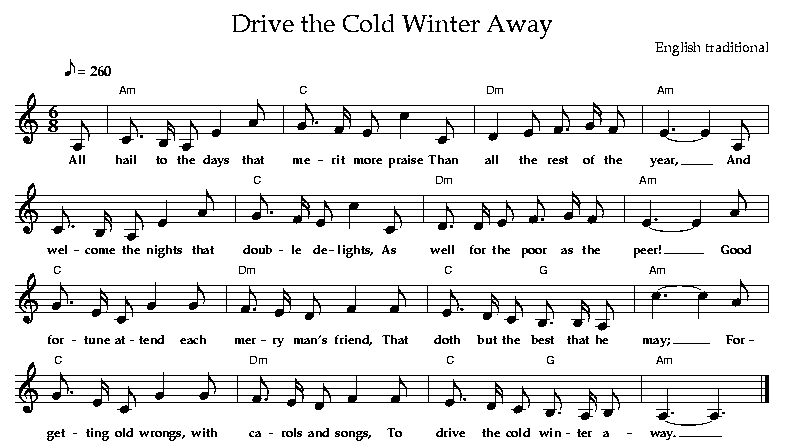
All hail to the days that merit more praise
Than all the rest of the year,
And welcome the nights that double delights,
As well for the poor as the peer!
Good fortune attend each merry man's friend,
That doth but the best that he may;
Forgetting old wrongs, with carols and songs,
To drive the cold winter away.
This time of the year is spent in good cheer,
And neighbors together do meet,
To sit by the fire, with friendly desire,
Each other in love do greet;
Old grudges forgot, are put in the pot,
All sorrows aside they lay,
The old and the young doth carol his song,
To drive the cold winter away.
To mask and to mum kind neighbors will come
With wassails of nut-brown ale,
To drink and carouse to all in the house,
As merry as bucks in the dale;
Where cake, bread and cheese is brought for your fees,
To make you the longer stay;
At the fire to warm will do you no harm,
To drive the cold winter away.
When Christmas's tide comes in like a bride,
With holly and ivy clad,
Twelve days in the year, much mirth and good cheer,
In every household is had;
The country guise is then to devise
Some gambols of Christmas play,
Whereat the young men do best that they can,
To drive the cold winter away.
When white-bearded frost hath threatened his worst,
And fallen from branch and brier,
Then time away calls, from husbandry halls
And from the good countryman's fire,
Together to go to plough and to sow,
To get us both food and array;
And thus with content the time we have spent
To drive the cold winter away.
The melody of “Drive the Cold Winter Away” is in all editions of Playford's The English Dancing Master. The words are in the Pepys and Roxburghe collections, and a version is also found in d'Urfey's Wit and Mirth, or Pills to Purge Melancholy. The song is reprinted in its entirety in William Chappell's Popular Music of the Olden Time. I have chosen to select five of the twelve verses found there. A somewhat different selection of verses has been published and recorded as “The Praise of Christmas”.